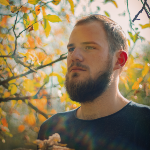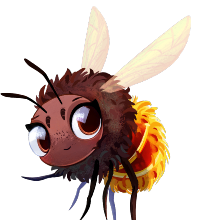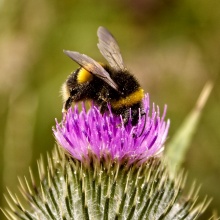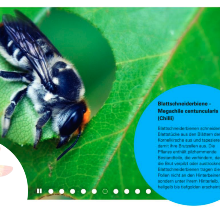Project focus
What would happen if wild bees die out?
Imagine a regular morning: You start your day with a cup of coffee, slip into your comfortable cotton shirt and make yourself some delicious muesli with lots of fresh fruit and nuts. You would have to do without all of this if it were not for those important helpers – our wild bees. More than 560 different species of wild bees are known in Germany but more than half of them are on the Red List or have already become extinct. Consequences are devastating: wild bees significantly contribute to the diversity of our ecosystem. However, the "wild sisters" of our well-known honey bees are often rather unknown creatures. Hence, raising awareness about the many challenges they face is of utmost importance.
Project goal
In this project, in transdisciplinary collaboration with experts from biodiversity, environmental didactics, school practice, and graphic and music design, we developed a mobile, cross-platform app for classroom use that incorporates virtual characters and game-based elements to demonstrate the great importance of wild bees to our ecosystem. Our goal is to increase sustainable awareness about the protection of wild bees. The current prototype includes eight levels, each employing a defined set of game mechanics. Each level introduces a selected topic: biodiversity, nesting places, feeding habits, enemies, or human actions for wild bee protection. Levels relate to real-world activities, which are embedded in project workshops and enable the user to transfer the virtual information into environmental actions.
Successful project completion
The BeeLife project, funded by the German Environmental Foundation (DBU), has been completed. At the end of two and a half years of intense research and development, an intervention has been created that combines a gamified, interactive learning environment with practical environmental activities in project workshops. The underlying didactical concept was developed for use in schools, primarily from 4th to 6th grades.
The app is available via the Apple AppStore and the Google PlayStore. The accompanying booklet for teachers is linked in the app, but can also be accessed here.

Publications
Scientific articles
- Mönch, J., Stock, A., Baatz, J., Krieglstein, F., Stock, O., Suren, M., Rey, G. D., & Wirzberger, M. (2022). “Wild sisters” meet app: Connecting virtual and real worlds to foster environmental awareness in classroom settings. In C. Bermeitinger, & W. Grave (Eds.), 52nd Congress of the German Psychological Society. Pabst Science Publishers. [Talk in the symposium "Green Ergonomics: An Engineering Psychology Perspective on Sustainable Development"]
- Wirzberger, M., Bornemeier, J., Kampel, S., Álvarez Serrano, M. G., Ullmann, L., & Rey, G. D. (2021). Umwelt trifft App: Verbindung virtueller und realer Welten in der Bildung für nachhaltige Entwicklung – Kurzbericht [Environment meets app: Connecting virtual and real worlds in education for sustainable development – Short report]. Umweltpsychologie, 1, 123–132. [PDF]
Public engagement
- Alumni newsletter at Chemnitz University of Technology 2021 [LINK]
- Poster at the LEAD "School & Science" day 2022 [LINK]
- Press article for the World Bee Day 2021 [LINK] [LINK]
- Press article for the World Bee Day 2022 [LINK] [LINK]
- Press article for the World Bee Day 2023 [LINK]
- Day of Science 2022 [LINK] [LINK]
- IRIS Coffee Chat 2022 [LINK]
Project team
University of Stuttgart
- Jun.-Prof. Dr. Maria Wirzberger (project leader)
- Judith Baatz
- Ankita Ghorpade
- Kristina Grausam
- Julia Mönch
- Adrian Stock
- Oliver Stock
Chemnitz University of Technology
Listed people were employed in different project phases during 2020 to 2023.
External expertise
Biodiversity, environmental didactics, wild bee protection
Graphics and sound design
Participating schools
- Georg-Ludwig-Rexroth-Realschule
- Theodosius Florentini Schule
- Bodelschwingschule Sindelfingen
- Johannes Kepler Gemeinschaftsschule Magstadt
- Gymnasium Neckartenzlingen
- Braike Grundschule Nürtingen
Project funding
This project was funded by the German Environmental Foundation (DBU).
Bee Life News
Kontakt

Oliver Stock
M.A.Research Assistant focusing on gamified sofware development
[Image: Private]




